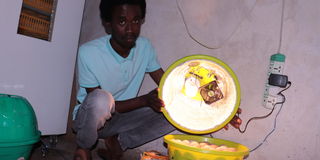Biz Lounge: Incubator business hatched from desire to solve mother's struggle

Mark Kiplel displays the basin incubator he has designed at his farm on September 20, 2024.
At 19, just after finishing high school, Mark Kiplel set his mind on helping small-scale poultry farmers increase their stock, a goal inspired by watching his mother struggle with traditional chicken-rearing methods.
Her hens often failed to hatch eggs properly or care for chicks effectively, hindering her ability to grow her flock.
As he awaited his transition to university in 2019, he began contemplating innovative ideas to address the problems he'd observed.
"I started with just Sh 1,200 that my father had lent me," Kiplel recalls. "With that money, I bought a small controller to regulate the temperature of my first incubator. At first, I used a carton box, but I quickly realized it wasn't sustainable or durable enough."

Samples of the basin incubators created by Mark Kiplel at his farm in Ngata.
His first motor malfunctioned, prompting him to ask his father for another loan to get his innovation up and running. This time, it worked.
After creating his prototype, Kiplel received an invitation from his high school teacher to advise agriculture students on the importance of studying the subject.
During this time, he was actively searching for the best and simplest design to improve his incubator. That's when the idea of using basins instead of cardboard boxes came to him.
"I fabricated my first incubator in December 2019, with a capacity of 15 eggs," says the Founder and CEO of Kiplel Farm, located in Baraka Estate in Ngata, Nakuru.
"I hatched the first 8 eggs after 21 days and felt the need to improve the hatching capacity."
Over the next three months, Kiplel continued refining his design.
"I kept working on it, making small improvements with each version," he explains.
"Eventually, I managed to improve its efficiency, increasing its size to hold about 38-40 eggs, and raise the hatching capacity to 85 percent."
Satisfied with the product's performance, Kiplel began selling the incubator in 2021.
The design features a fan for even heat distribution, a bulb as a heat source, and two basins - one to hold the eggs and water, and the other used as a cover.
Since then, Kiplel has sold over 100 incubators to farmers in Nakuru and as far as Baringo, Bomet, Kericho, and Mombasa counties, making a profit of about Sh. 20,000 a month.
Priced at just Sh. 3,700, Kiplel's incubator costs only a third of its competitors' models, which can run up to Sh. 11,000.
"With the money I accumulated as savings for the business, I added a 2,000 egg capacity incubator in 2023 to hatch more eggs," says the 24-year-old.
"We established a clientele interested in day-old chicks and needed to meet that demand."

Mark Kiplel inspects newly hatched chicks at his farm in Ngata on September 20, 2024.
Using the incubators, he now hatches around 500 chicks per week, selling them to other farmers. Day-old chicks sell for about Sh. 100, while month-old chicks go for Sh. 230, raising his monthly sales to about Sh 250,000.
Kiplel's efforts have not gone unnoticed.
In 2023, his innovation was recognized at the Startup Innovation Olympiads continental competition for TVET students in Accra, Ghana, where he came in third place, winning USD 1,000.
He reinvested this prize money into his venture, further fuelling its growth.
Kiplel adds that he's been running the farm together with his brother, an Animal Science graduate which has helped them keep costs in-house and low, contributing to the business's growth and success.
